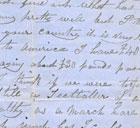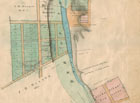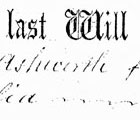Edmund Ashworth
I was born in the Year 1818 on the 21st February in the Township of Rochdale in the County of Lancashire, England...My parents had not the means to send me to school or they would have done so. But, thank God, I has[sic] the privilege of going on a Sabbath Day and to my knowledge I never cost my parents anything for scholarship.[18]

This is the beginning of Edmund Ashworth's diary that, together with a surviving letter, give us glimpses of his life in the Colony.
Edmund arrived at the Swan River Colony in 1847 as a soldier, but he was conditionally discharged in May 1849 and became a police constable. However, after only six months he left the police and the following year he moved to the Avon Valley where, at first, he worked for James Nairn at his property 'Spring Dale' near York.
While at York in 1860 Edmund wrote to his brother about the land and its potential to be productive:
I have been expecting that we should find gold in this country for there as[sic] been several reports of it being found but they have all proved groundless as yet...this is a fine country for horse breeding for we furnish a great number for the Indian market,and it is also pretty well for sheep and cattle but they have to be looked after for there is a small bush which poisons sheep and cattle, but the horses can run all over the place for it will not poison them. There is some very good patches of land here. Wheat now is about seven shillings per bushel, mutton six pence per lb beef 8 ds butter 2/6 per lb, Government land is now reduced to ten shillings per acre and if I don't shortly get a chance to come to America I think I shall buy about twenty acres...
I have got a small sample of wheat of a large grain and some of a smaller kind I herein close you a grain of it and you can try it, we have plenty of Kangaroos and Opossums in this country, vegetables such as cabbage and turnips or peas we can grow but the potatoe[sic] we cannot depend on a crop up in the country for the slight frost nips them off in winter and the summer is too hot and too dry for sometimes we are six months without a shower of rain. But still the country is very healthy...[19]

It seems that Edmund did not get a chance to go to America (or he changed his mind) but he did purchase ten acres in the town of York, built a cottage on this in 1862 and, over the next twenty five years, acquired hundreds of acres of farmland in the district. Unfortunately though, there is not sufficient material to really assess the extent to which Edmund felt a sense of belonging at his home in York.
He concluded his diary by stating simply:
In 1863 I planted a quantity of Tobacco and manufactured some. 1864 planted round the field about 100 plum trees. And on the first of November 1874 I joined the T.O.C. (Town of Cambridge) Templars and it was named the Star of the East Lodge.[20]

Edmund was a successful farmer, an active member of the York community and, at the time of his death, he had ten children. Thus, during his years at York he made very tangible connections to people and place, and it is likely that he felt attached to his property and the town, but without more evidence it is not possible to say that he felt a deep sense of belonging.
Edmund Ashworth died in York in 1888 and was respectfully remembered in the Eastern Districts Chronicle:
...The deceased who arrived in this colony in the days of its infancy, has had to contend with many difficulties, but not withstanding they appeared at times insurmountable, with considerable pluck and energy he persevered until he had made a comfortable homestead and has always been looked upon as thoroughly straightforward and honest in all his transactions...The deceased leaves a wife and ten children but most of them are in a position to provide for themselves.[21]
Page last updated: Thursday 22 September 2011 by Illona Tobin Asset ID 44019
Editors for this page nick 2nd account
login


